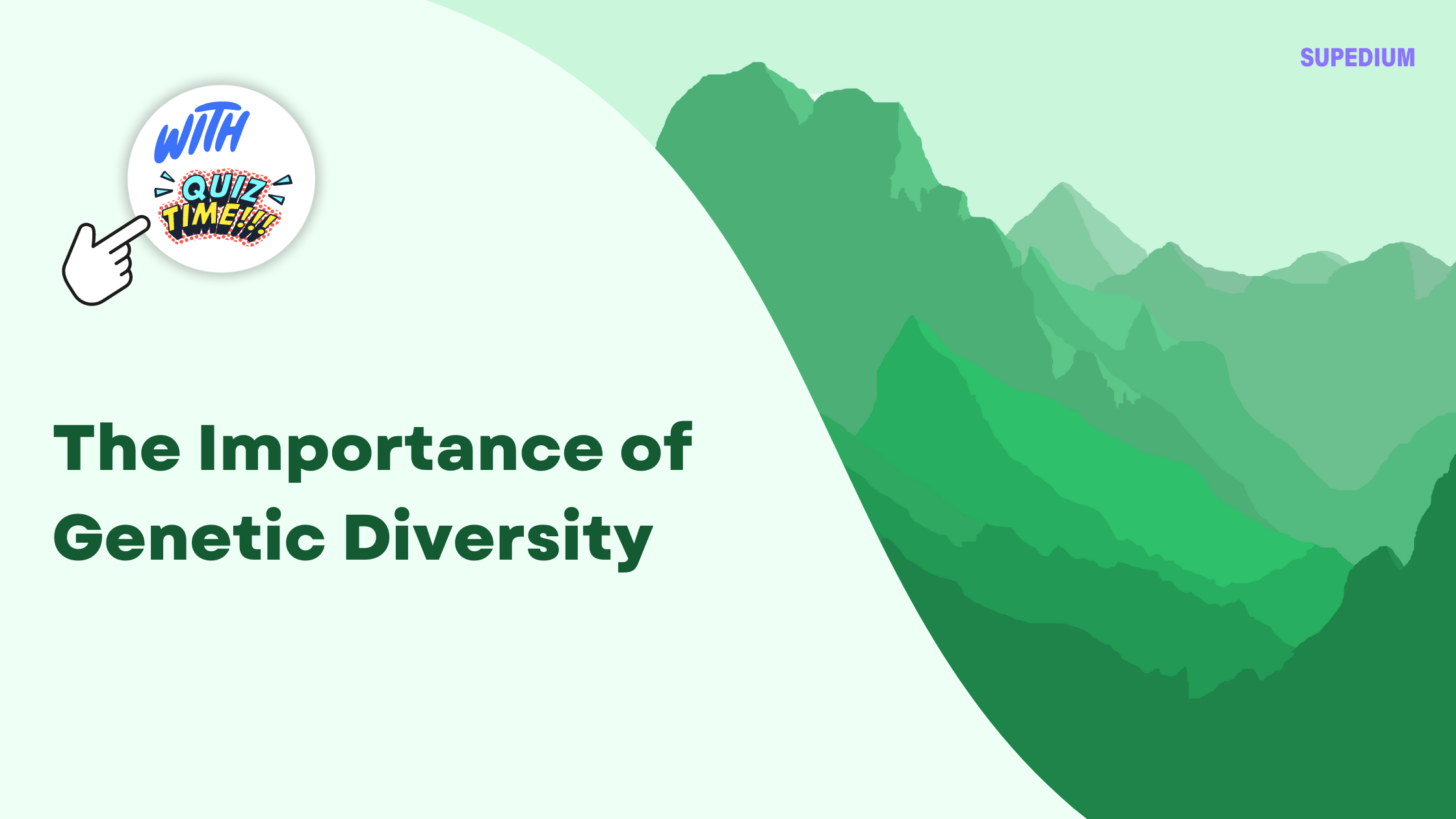Table of Contents
![]()
Genetic diversity is a cornerstone of life on Earth, underpinning the adaptability and resilience of species and ecosystems. It refers to the variety of genetic characteristics within a species and between populations. This diversity plays a crucial role in evolution, ecosystem stability, conservation efforts, and human health. Understanding and preserving genetic diversity is essential for maintaining the balance of natural systems and ensuring the sustainability of life on our planet.
Genetic Diversity and Evolution
Mechanisms of Evolution
Genetic diversity is fundamental to the processes of evolution. Evolution operates through several mechanisms, including natural selection, genetic drift, and gene flow. Natural selection favors individuals with traits that provide a survival or reproductive advantage, driving evolutionary change. Genetic drift, which is the random fluctuation of allele frequencies, can have a significant impact in small populations. Gene flow, the transfer of genes between populations, helps maintain genetic diversity and facilitates adaptation.
Adaptation to Changing Environments
One of the key roles of genetic diversity is enabling species to adapt to changing environments. Populations with high genetic diversity have a broader range of traits that may be advantageous under different conditions. For instance, genetic variation can enhance resistance to diseases and pests, which is crucial for survival. Similarly, as climate change alters habitats, species with diverse genetic backgrounds are better equipped to cope with new challenges.
Examples of Evolutionary Success
The famous example of Darwin’s finches on the Galápagos Islands illustrates the importance of genetic diversity. These birds evolved various beak shapes and sizes to exploit different food sources, a testament to how genetic variation can drive adaptive evolution. Another example is the peppered moth in England, which evolved color variations that provided camouflage against changing levels of industrial pollution.
Genetic Diversity and Ecosystem Stability
Role in Ecosystem Functioning
Genetic diversity within species contributes to the overall health and functioning of ecosystems. Ecosystems rely on a range of species and their interactions to provide essential services, such as pollination, nutrient cycling, and soil formation. Diverse genetic backgrounds within species enhance their ability to perform these functions effectively, supporting ecosystem stability and resilience.
Impact on Food Webs
In food webs, genetic diversity plays a crucial role in maintaining balance. Variations in genetic traits among predators, prey, and producers affect their interactions and the stability of the web. For example, a genetically diverse prey population is less likely to be wiped out by disease or environmental changes, ensuring that predator populations have a stable food source.
Examples of Ecosystem Disruptions
The decline in genetic diversity can lead to significant disruptions in ecosystems. Coral reefs, for instance, are highly sensitive to changes in genetic diversity. The loss of genetic variation in coral populations can reduce their ability to withstand diseases and environmental stressors, leading to coral bleaching and reef degradation. Similarly, agricultural monocultures, where a single crop variety dominates, can reduce ecosystem resilience and increase vulnerability to pests and diseases.
Genetic Diversity in Conservation
Importance for Species Survival
For many species, maintaining genetic diversity is crucial for survival. Low genetic diversity can lead to inbreeding depression, where close relatives mate and produce offspring with reduced fitness. This can result in increased susceptibility to diseases, lower reproductive success, and higher mortality rates. Conversely, populations with higher genetic diversity have a greater ability to adapt and thrive in changing environments.
Strategies for Conserving Genetic Diversity
Conservation efforts aim to preserve genetic diversity through various strategies. Protected areas and reserves help safeguard habitats and the species that live within them. Seed banks and gene banks store genetic material from plants and animals, providing a repository for future restoration efforts. Captive breeding programs are also employed to bolster populations of endangered species and increase their genetic diversity.
Challenges and Limitations
Despite these efforts, conserving genetic diversity faces several challenges. Habitat destruction continues to threaten many species, reducing their population sizes and genetic diversity. Climate change further exacerbates these pressures, altering habitats and affecting species’ survival. Managing genetic diversity in small populations is also difficult, as they are more prone to genetic drift and inbreeding.
Genetic Diversity and Human Health
Genetic Variability in Populations
Genetic diversity is also vital for human health. Variability in human populations affects susceptibility to diseases and responses to medications. For example, genetic diversity contributes to varying immune responses, which can influence how individuals respond to infections and vaccines. Pharmacogenomics, the study of how genes affect drug responses, relies on genetic diversity to develop personalized medicine strategies.
Implications for Public Health
Understanding genetic diversity has significant implications for public health. Managing genetic disorders involves recognizing the diverse genetic factors that contribute to these conditions. Vaccination strategies can be tailored based on genetic data to improve effectiveness. Additionally, research on genetic diversity can help identify populations at risk for certain diseases and develop targeted prevention measures.
Ethical Considerations
The study and application of genetic diversity raise ethical considerations. Genetic testing, for example, can provide valuable information but also raises concerns about privacy and potential misuse of genetic data. Genetic modification, while offering potential benefits, also poses questions about equity and long-term effects on genetic diversity.
Case Studies
The Cheetah Population Crisis
The cheetah population is a notable example of the consequences of genetic bottlenecks. Historically, cheetahs experienced a severe population decline, resulting in a significant reduction in genetic diversity. This has led to issues such as reduced fertility and higher susceptibility to diseases. Conservation efforts, including genetic studies and breeding programs, aim to address these challenges and restore genetic diversity.
Agricultural Diversity
Agricultural practices also highlight the importance of genetic diversity. The Green Revolution, which introduced high-yielding crop varieties, significantly increased food production but also led to a reduction in crop genetic diversity. This reliance on a few crop varieties has made agriculture more vulnerable to pests, diseases, and changing environmental conditions. Efforts to preserve heirloom varieties and promote crop diversification are essential for maintaining agricultural resilience.
Conclusion
Genetic diversity is a fundamental aspect of life that supports evolutionary processes, ecosystem stability, conservation efforts, and human health. Its importance cannot be overstated, as it provides the foundation for adaptability, resilience, and sustainability across various contexts. Promoting conservation strategies, supporting research, and adopting sustainable practices are crucial steps toward preserving genetic diversity for future generations.






Be the first to comment